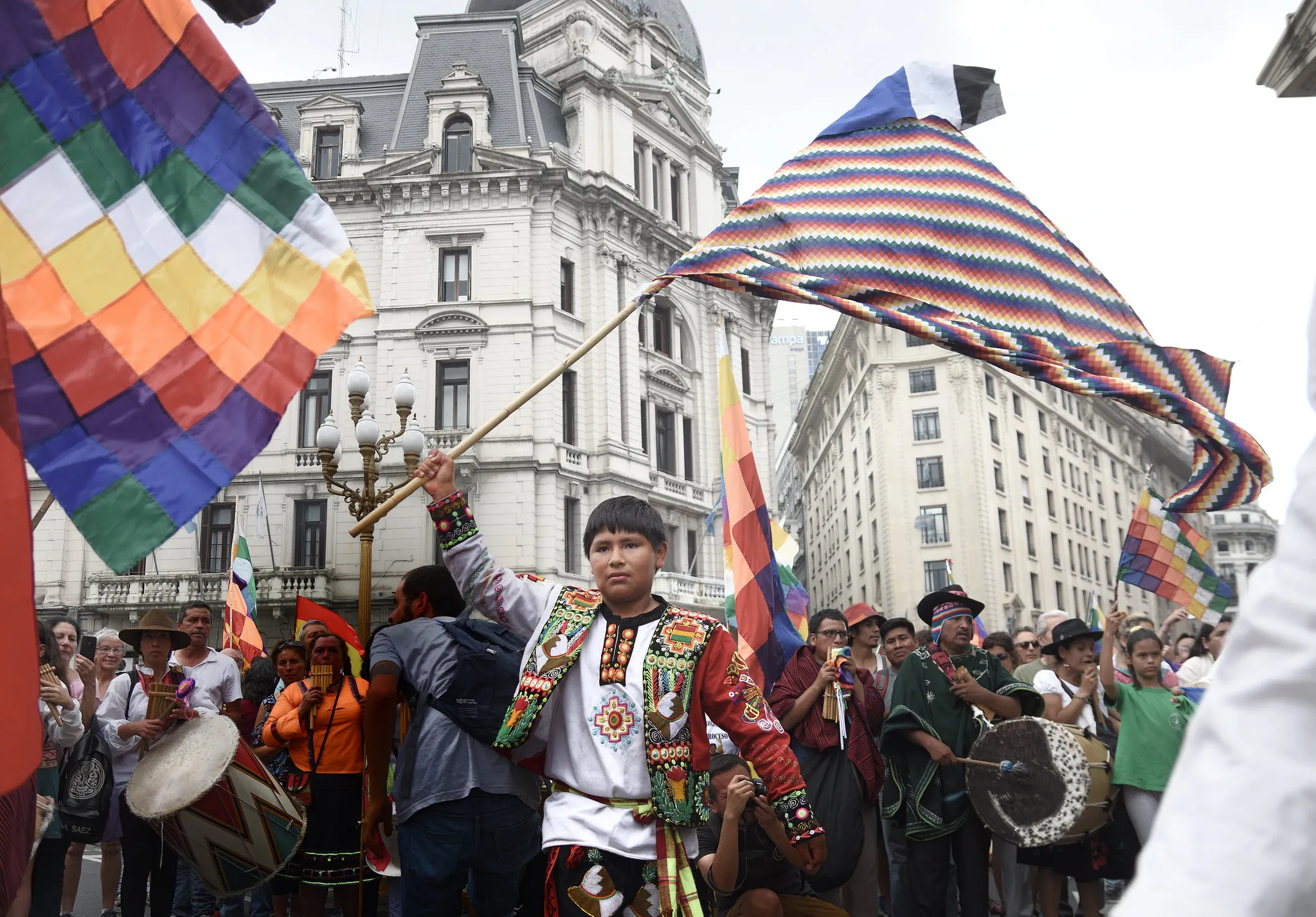
In this Sunday, 18 October, general elections' voters will elect the principal executive and legislative branch authorities at the national level. Bolivia elects the president and vice-president by popular and direct vote, along with the members of the Plurinational Legislative Assembly (senators and members of the Chamber of Deputies, i.e. the lower house), in concurrent elections.
Disclaimer: Views expressed in this commentary are those of the author. This commentary is independent of specific national or political interests. Views expressed do not necessarily represent the institutional position of International IDEA, its Board of Advisers or its Council of Member States.
Este artículo está disponible en español.
Background
From the short-term perspective, Bolivian democracy suffered a major impact as of October and November 2019, with the annulment of the electoral process which was marked by a series of irregularities. A tense mood prevailed from the day of the vote to the resignation of former President Morales that activated the latent polarization between the sectors supportive of the MAS and the sectors backing the opposition. To these factors were added, as of March 2020, the impacts of the COVID-19 pandemic on health, the economy, education and governability because of the clear disconnectedness or open fractures among the different levels of government. Due to the measures to contain the pandemic the general elections initially scheduled for 3 May had to be postponed repeatedly amid mounting tensions and, in more than one case, with violent demonstrations that threatened institutional stability and peaceful coexistence.
Importance of this election
The 2020 election is fundamental for reestablishing the legitimacy of the government bodies as well as for social stability, for one can expect, albeit without full assurances, that the people will enter a sort of recess from pressing their urgent demands while the new administration takes office and adopts the first measures to address the serious crisis Bolivia is experiencing. In addition, the adequate management of the election process underway is fundamental for the Plurinational Electoral Organ (OEP: Órgano Electoral Plurinacional) to regain credibility as an authority of the State. Doing so is of the utmost importance, even beyond the legitimate election of the public authorities, as the erosion of its credibility may call into question the capacity that Bolivian society has displayed, since the re-establishment of democracy in October 1982, to resolve its profound political, social, economic, and regional disputes through the ballot box.
What offices are up for election
In the 18 October general elections voters will elect the principal executive and legislative branch authorities at the national level. Bolivia elects the president and vice-president by popular and direct vote, along with the members of the Plurinational Legislative Assembly (senators and members of the Chamber of Deputies, i.e. the lower house), in concurrent elections.
How are the office-holders elected? Electoral system for president
The system for electing the president and vice-president includes three possible paths, two in the first round and one involving a second round. First, the ticket that finishes first must obtain 50% plus one of all valid votes. Second, the ticket that finishes in first place must obtain at least 40% of valid votes and also a differential of at least 10 percentage points over the second-place finisher. If no slate obtains one of the results described above, then a second-round election is held (runoff) between the two top finishers. The presidential candidate heads up the lists from which a large share of the members of the Plurinational Legislative Assembly will be elected.
How many lower-house legislators and how many senators; term
Bolivia has an asymmetrical bicameral system: the composition of the Senate is based on territorial representation; thus, its 36 members are distributed equally among the nine departments (four each). Its members are elected in each of the nine departmental districts, based on closed lists in blocs that accompany the vote for the presidential candidate, and by the proportional formula of simple natural divisors. The Chamber of Deputies is constituted on the basis of populational representation, thus the number of members from each department varies with the population, with a minimum of five seats per department. In the assignment of seats, the process is a mixed proportional system. Half of the members are elected in uninominal districts by majority vote, while the other half are elected proportionally in plurinominal districts. Of the total 130 members, seven seats are reserved for indigenous minorities through special districts. Finally, nine supra-state representatives are elected who are members of the legislature without the right to vote. The election of all the members of the Plurinational Legislative Assembly is for a term of five years, and parties must observe the principle of gender parity and alternation.
Presidential candidates and campaign issues
Eight initial candidacies: Acción Democrática Nacionalista (ADN) with María Bayá, Comunidad Ciudadana (CC) with Carlos Mesa, CREEMOS with Luis Fernando Camacho, Frente Para la Victoria (FPV) with Chi Hyun Chung, JUNTOS with Jeanine Añez, Libertad y Democracia (LIBRE 21) with Jorge Quiroga, Movimiento Al Socialismo (MAS-IPSP) with Luis Arce, and Partido de Acción Nacional Boliviano (PAN-BOL) with Feliciano Mamani. Of these eight initial political forces, the alliances JUNTOS and LIBRE 21 have pulled out of the political contest (JUNTOS four weeks ago and Libre 21 three days ago). In light of the opinion surveys, only three of the candidates that are continuing to participate in the race are particularly relevant and their parties will win a significant presence in the Plurinational Legislative Assembly.
The recovery and diversification of the economy, a solid health system, education with a strong emphasis on scientific and technological development, as well as transparency in public efforts to fight endemic corruption, all profoundly marked by the impact of the COVID-19 pandemic, are the three central and recurrent issues in the election campaign. Finally, though no less important, especially in the discourse of the forces opposed to the MAS, one notes a major emphasis on the need to recover the democratic institutional framework, which suffered major erosion during the MAS government, and also during the current transition government.
Citizen perceptions; citizen confidence in the process and in the Supreme Electoral Tribunal
In early 2020, as the national government and President Añez found their levels of trust declining, the Supreme Electoral Tribunal enjoyed 61% confidence that it would carry out a clean and transparent election.[1] Nonetheless, the repeated delays on the day of the vote and the intensive smear campaign unleashed both by the MAS and by the party of President Añez and some opinionmakers against the Supreme Electoral Tribunal, and in particular against its president, Salvador Romero, have significantly eroded that level of confidence, such that as of early April 40.4% of the population gave it a vote of confidence, but 50% distrusted it.[2]
What do the latest polls say? Voter intentions, who are undecided
The latest polls agree on the likelihood of a second round, without discarding a MAS victory in the first round (CIES Mori). One crucial data point is that 19% are undecided and that they may determine the results on the first round if they back the MAS. It is striking that the Página Siete poll is the only one that gives Carlos Mesa a chance of winning on the first round, albeit without a sufficient difference for him to win the presidency outright (the results of the latest polls are appended).
Final comments
The challenges posed by a democracy receding for at least 20 years, the traumatic events of October and November 2019, the arrival of the pandemic, and the costs and challenges generated by it for society, the economy, governability, and the very election process now under way, taken together with growing citizen distrust in politics and political institutions, make this election determinant both for the democratic institutional framework and for the relationship of the citizenry with the political system.
Everything indicates that the next administration will have to take up profound reforms in all areas of the public agenda. That requires a great capacity to construct agreements among the political actors, and also between them and the various and increasingly demanding and mobilized civil society organizations.
ANNEX: Results of the last polls
- Ciesmori
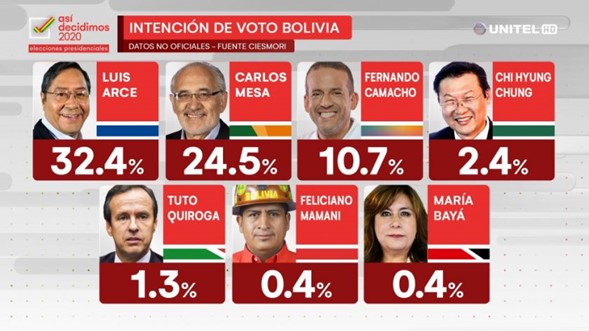
According to the study by Ciesmori, carried out from September 29 to October 8, and requested by Unitel and Bolivisión, Arce would win 32.4% of the votes and Mesa 24.5%. Luis Fernando Camacho remains in third place, with 10.7%.
Then come Chi Hyun Chung of the Frente para la Victoria (FPV), with 2.4%; Jorge Tuto Quiroga of Libre 21, who set aside his candidacy this Sunday, 1.3%; Feliciano Mamani of the Partido de Acción Nacional Boliviano (PAN-BOL), 0.4%; and María de la Cruz Bayá of Acción Democrática Nacionalista (ADN), with 0.4%.
- Ipsos
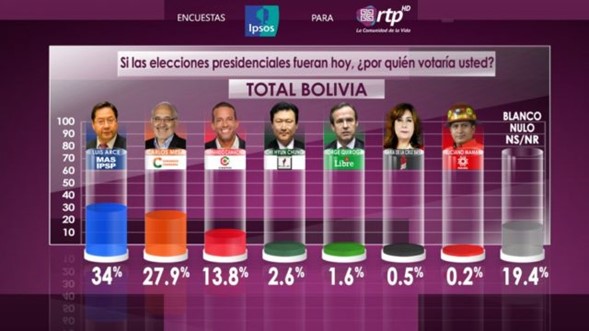
The IPSOS poll for Sistema RTP, carried out from September 21 to October 4, notes that the candidate for the MAS, Luis Arce Catacora, and the nominee of Comunidad Ciudadana (CC), Carlos Mesa, would go to a second round after the October 18 elections. The margin of error is +/- 2.2%.
According to that study 34% of the voters support the candidate of the MAS, while 27.9% back the nominee of the CC. The difference is 6.1 percentage points, which would require holding a second round after the October 18 elections. The candidate for Creemos, Luis Fernando Camacho, appears in third place in voters’ intentions, with 13.8% of popular support. Far behind the first three are the nominee of the Frente Para la Victoria (FPV), Chi Hyun Chung, with 2.6%, and Jorge Tuto Quiroga (Libre 21), with 1.6%.
- Jubileo
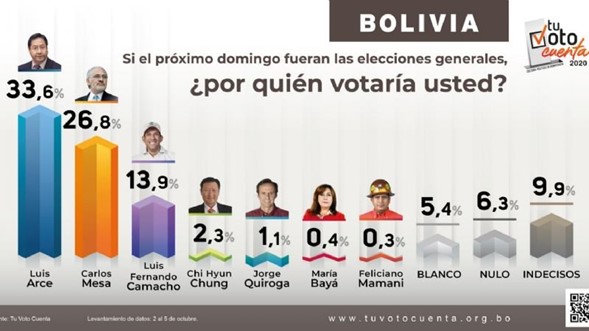
The presidential candidate for the Movimiento Al Socialismo (MAS), Luis Arce, is leading in the second survey of the Tu Voto Cuenta alliance, with 33.6%, followed by his rival from Comunidad Ciudadana (CC), Carlos Mesa, with 26.8%, such that with the difference of 6.8%, a second round is to be anticipated. In third place is the former president of the Comité Cívico pro Santa Cruz and candidate for Creemos, Luis Fernando Camacho, with 13.9% of voter intentions; while Chi Hyun Chung, of the Frente Para la Victoria (FPV), has 2.3%.
More than 20% are undecided. According to the survey by Tu Voto Cuenta, 21.6% of those surveyed are among the undecided voters.
The margin of error is +/- 0.79%. The days of the survey were from October 2 to 5, 2020, when the presidential debates were held in Santa Cruz and La Paz.
- Página 7
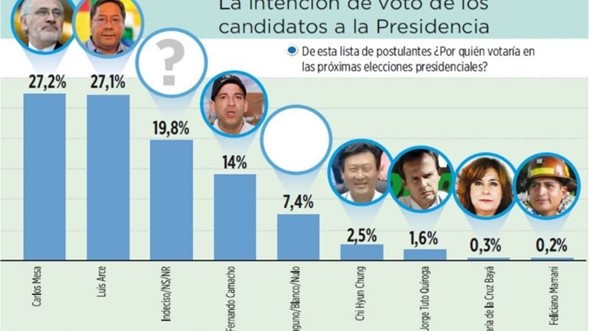
The field work was done from September 20 to October 8; it was carried out nationally, in urban, provincial, and rural areas. The target population was made up of persons over 18 years of age, who reside in Bolivia; they were interviewed by cell phone.
Some 27.2% said that they would support Mesa, 27.1% Arce, and 14% Camacho. Of those surveyed 2.5% stated that they would give their vote to Chi Hyun Chung, candidate for the Frente Para la Victoria; 1.6% said that would support Jorge Tuto Quiroga, the nominee for Libre 21; 0.3% said they would vote for María Bayá, of Acción Democrática Nacionalista (though that party decided to drop out of the race this week); and 0.2% stated that they would back Feliciano Mamani, the candidate of Pan-Bol.
Some 19.8% of those surveyed said they were undecided, and 7.4% stated that would not vote for anyone or would cast a blank of null vote.
Source: International IDEA's Latin American and the Caribbean Programme, Bolivia Programme.



